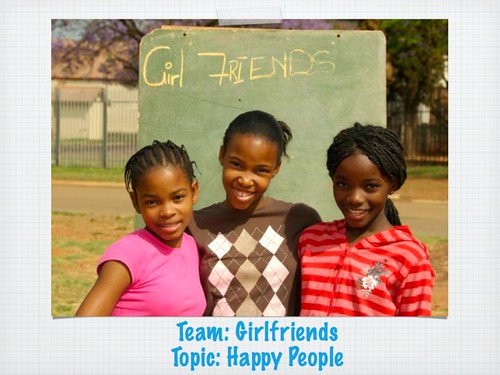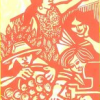Session leader: Emily Jacobi from Digital Democracy, on Youth and experiences with integrating youth.
Notes were taken by Jules Rincón and second half by Sara Standish after laptop ran out of battery.
Sarah Standish, sharing and exchanging ideas online. Youth discussing health, environment, poverty, and youth are supposed to share ideas in forums and blogs, and their activities are some successful, some aren't. But the quality of interacting isn't that great, the quality of what they share is considered low, and it could be a language barrier, so they partnered with multilingual forum between Arabic and English (Meedan). But interaction level has gone up but not as much as they wanted, there are issues with plagiarism, students feel they have to publish, so they publish whatever comes to mind. She would like to know how to integrate youth.
Nishant in _Bangalore India: he works for the center for internet and society. They look at the potential for social transformation. they have hypotheses on why youth in development are apolitical.
Youth are reinventing ways in which to deal with politics. They are using other networks, other ways of mobilizing.
With internet there is a new aesthetic of playfulness and experimentation. So not all responses to crisis are going through the old ways of dealing with questions: forums, letters, open forums.
Young voices are mediated by adults who are “experts”. They don't want to talk to adults for them to publish books and youth never hear about them.
So they are finding ways to create spaces of interaction: policy, emotional or technological levels, but without adults mediating.
Marietta, Global Voices Hungary: in NGO working with young people. Youth don't interact with adults. She's interested in the experiences to find out if there is a way to interact with adults.
Emily is in youth journalism since she was 12. So between 10 and 18 she produced a weekly news article for the largest newspaper in her state. The US has a large history of youth media between youth for youth, but she worked with youth for adults. Many programs are by adults giving youth a bigger voice. So content has to change. She wants more youth voices in Citizen media.
Issa Villarreal: she is involved with several youth groups, with workshops to teach others digital online tools free of cost She's done it for 3 years. They also gave a rap workshop so that children could read more and learn about verses through hip-hop. She is involved in projects in the music scene, and has a news agency for the independent musicians, where they can share their music and get known. they review the music and write about them. And she is also involved in the graffitti scene, how they use new media to stay in touch.
Youth stay in touch through online tools, for graffiti and street art gatherings and interventions. they are very good at keeping their anonymity and keeping their security.
Sana Saleem from Pakistan wishes to hear success stories so that she can set up workshops back home so that the way youth is viewed can change.
Juhie Bhatia writes about health for GV, but also about women issues, but she is reaching people who are already involved in women's issues. She wants to involve younger women interested and involved through social media, but also to include stories on younger women.
Persephone Miel for Internews Network work with traditional media, but some with youth media. In the south Caucasus kids are trained to do TV, and they share content within 3 countries. It is adult driven.
Nishant: Youth have a different way of interacting with the realm of the political, even going on facebook can be a new way of political. Also young people are frustrated by the data collectors. Wants to create a peer-to-peer network where youth can create their own structures of interaction without mediation from outside researchers.
Marietta of GV Hungary: has been working with NGOs who are struggling with communicating with young people. Even if they have a FB or twitter account, it doesn’t work.
Emily: has been involved in youth journalism for a very long time bc she started when she was little in a youth journalism. They did “by youth for everyone” journalism, not “by youth for youth.” One thing special about the program she was part of was that youth lead it – youth make the main decisions, but with help of mentors.
Issa: involved in several informal youth projects. Each year they do workshops about teaching others for free how to use social media. Gave a rap workshop to involve children in reading more by teaching them hip-hop. Involved in projects related to the music scene in her city. They have a news agency for Indie bands. Her friend is teaching them how to record their music and put their albums on line. She is also interested in the graffiti scene in Mexico and how they use social media to get in contact with each other. Graffiti artists know how to preserve anonymity even better than adults.
Sana: looking for success stories.
Persephone: does some work with youth media, Some success stories, some less so. Some of the youth media e.g. in Caucasus are mostly adult-driven. Looking for more ideas.
Juliana: Convince that youth have voices, but not convinced that they want the world to hear them. Thinks that’s why there’s not much youth dialogue, because they have their secrets. They write and get published, but on Facebook, because there are less voices. Are we the ones who want to hear youth voices, and youth not the ones who want to share their voices? Should we wait for youth to come share their voices, not ask for them to share their voices with us?
Victor: Was involved in youth media at a time when few had mobile phones in Malawi. In past few years, he hasn’t worked in youth media anymore, but there is increasing youth of internet platforms by youth. He wants to see a project where he’s able to bridge different formats with a radio program. There is a local version of Facebook in Malawi. How can he utilize FB together with radio? He’s looking for some thoughts on how to bridge new and traditional media in that way.
Eman: She is a founder of a project in Arab countries for women to speak about their issues. For the first two years it was only in Egypt and the second two years were in other Arab countries as a whole. Her issues with youth: they lose enthusiasm very fast. It’s so hard to find people who are committed for long term, esp when it’s voluntary work.
Anne Nelson: Recent Pew study says that youth are spending an average of 6 hours per day wired, she’s very concerned about this and thinks they’re losing other skills when they do too much online. Has two children in college that leads her to be concerned about this.
Moderator’s Qs: When youth lose enthusiasm in a project, is that a bad thing?
Juliana: When she was a teen and involved in projects, she didn’t stick around—understand not being focused. For young people, being committed for a year is a very long time. Thinks having a definite starting and ending point helps with this. When something has a definite short cycle, it feels less daunting to join.
Nishant: Agrees: says that when he only asked youth to commit to one session at a time, enrollment went up. Important to remember that researchers’/adults’ questions are not the important questions to youth. Youth were saying that they want to be heard, but they don’t want to say the things that adults want to say. They provided them with more open space. He believes that if they don’t want to blog about anything except for fashion, that’s okay. Example from Shanghai: singing duo that lipsyncs to Backstreet boys. They said that in China they are extremely popular; they said that they are not just having fun, they are actually being political. They said they had not had a chance to express this before. Japanese notion of kuso, which means shit. Reaction to pressure on each child in China to be very productive – people rebel by being silly and making shit out of things and making important stuff out of shit. The singers wanted to tell this story, but no one was asking them about it. The stuff that youth might want to talk about is actually incredibly important, and we should give them space to do so.
Emily: It’s about viewing young people as full human beings. They may not have full political rights. Therefore them having a voice in media is important. Is there a space for teens to say what they want to say?
Juliana: there is but adults are always criticizing it.
Emily: Kids have always shared stuff that adults would probably find scandalous, but now it’s very public.
Nishant: has been teaching a course in Bangalore. His 17 year old student told him that blogging is so 20th century, that she (the student) said that she writes but they will never know where she does it.
Emily: In her experience the youth she was working with were very thoughtful and serious about what they were producing. They had to be extra-good at journalism because they were kids. Among kids is there a need to separate social media and public media?
Persephone: youth don’t see social media as public media.
Juliana: Maybe the step that should be taken is to find those who would be writing anyway. Those who have things to say and are already saying them—give them a place to say it publicly.
Victor: It depends on the background of the youth and what they are able to access. In Malawi, being on facebook is the “in” thing and everyone wants to be there. For others, radio is the “in” thing and they don’t want moderated radio, they want to have free reign. Relatively, for those who are very interested in FB, they are not keen on radio—they prefer TV. But those who are outside those platforms are more keen on using radio to express themselves. Both groups want space of their own.
Julia: Her women’s health website – a young woman who had started a juggling school. Older women were resistant to publishing this story.
Sarah: Should we just use FB instead of creating separate websites?
Juliana: Do we read or moderate youth content if we really want it to be free?
Nishant: Flash mobs can be political. Stuff that can be frivolous 95% of the time can also be mobilized for political purposes 5% of the time. Youth people in 6 countries came up with this model.
Emily: This returns to the questions of what are the goals of these youth projects. Even as there is a lot of excitement about social media, there is also a lack of youth voices in traditional media. Also how do you promote voices that do want to be heard?
Juliana: Youth might be supporting anarchy by speaking in code, misspelling words, but it’s really irritating!
Nishant: text speak is interesting because it says that we are not open books.
Juliana: Yes, this way you can speak out publicly and your parents will never know what you’re saying. Should we teach them how to fit into our world our teach them to fit into ours?
Issa: Best case scenario is that they will split their communication into formal and informal communication.
Victor: Example of Grocot’s Mirror project in South Africa: young people send SMSs to the newspaper and they get published and they contribute to stories. There are young people who edit these.
Juliana: Maybe what we need is bridge bloggers: youth who can give us a context for the youth.
Emily: Lately has been doing a lot of multimedia trainings. Youth pick it up really fast. Tells youth that they can document anything they want. Creative self-expression can really be facilitated this way and opens a forum for students who are not good at writing already. As digital camera become cheap this becomes easier. Have to have a community partner in this case who will take responsibility for the cameras. Helps people value things in their lives that youth did not know were valuable.
Anne Nelson: Issue going back to the dark side. Is question of bullying online just in the U.S?
Everyone says it is found in their countries.
Nishant: This is a visible problem in India. A few young people even tried to commit suicide.
Juliana: There isn’t even a word for this in Spanish so it’s hard to get the message across. People tend to view it as “just kids being kids.”
Anne: disturbed by some uses of FB to guess things like which of their friends are virgins.
Juliana: That existed before FB just not online.
Emily: Agrees, all these happened before. It’s a question of scale. But on the other hand, if it’s more out in the open, is there more that we can do to combat it?
Nishant: On the positive side, the scale of stuff allows people to mobilize different resources to combat bullies, e.g. bullying them back via FB and providing a support system for people who are being bullying. So FB was a space for subversive dialogue that would otherwise have not been possible.
Juliana: As GV we should find out more about where youth are speaking and incorporate them more.
Emily: Youth are vibrant members of the community, not just specimen to be study.
Nishant: His group will bring 300 young people from 20 countries together.
Group will start a youth media interest list serve.
 Girl friends from Digital Democracy's Project Einstein youth media project in South Africa.
Girl friends from Digital Democracy's Project Einstein youth media project in South Africa.










